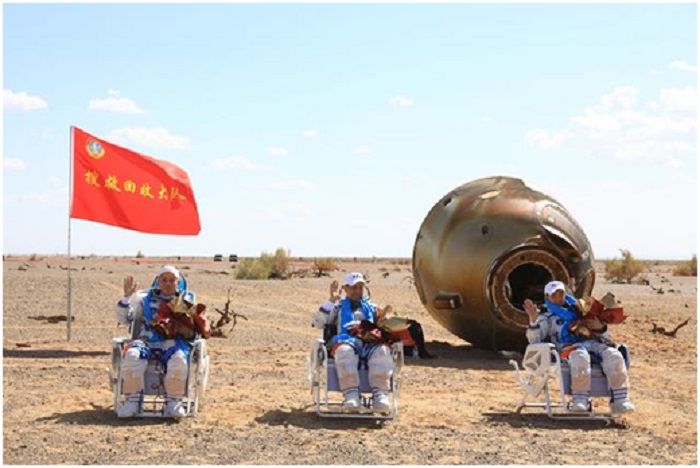



Three Chinese astronauts, Nie Haisheng, Liu Boming, and Tang Hongbo, who were sent into space onboard the Shenzhou-12 spaceship for the space station construction mission on June 17, departed from the Tianhe core module of China’s space station about 400 kilometers above the Earth and landed successfully at the Dongfeng landing site in north China’s Inner Mongolia autonomous region on Sept. 17, 2021, Beijing time.
The successful manned mission marks the second time within five years that China’s Shenzhou manned spaceships have taken Chinese astronauts to space and brought them back home safely, represents the complete success of China’s first crewed space flight during the construction of the country’s Tiangong space station, and bears great significance for the country’s advancing its space station project as planned.
Spending 90 days at the space station, the Shenzhou-12 crew have set a new record for China’s manned space mission duration and gained rich experience for future space flights.
From the big smile on the faces of the three astronauts after their landing on the Earth, people saw another stride of China on its space exploration journey.
As China’s first manned space flight mission during the construction of the Tiangong space station, Shenzhou-12 manned space mission is of profound significance and has achieved rich fruits.
From building Chinese people’s “new home in space” to entering the space station and carrying out extravehicular activities twice in one space mission, and from one day of the Shenzhou-5 to 90 days of the Shenzhou-12 in space, China’s footprints in outer space represent the progress of its space program and the results of the efforts of people working for the program.
As bigger and bigger leaps were made in space technology and more and more challenging tasks were completed during China’s seven crewed missions to space, Chinese astronauts’ living and working conditions in space were improved constantly. Meanwhile, their sense of responsibility, perseverance, and resolve to strive for sci-tech self-reliance and self-strengthening have never changed.
Young aerospace workers of the country, who are calm and confident, have fully demonstrated the spirit of aerospace in their work. They give instructions to start the countdown for the launch of satellites in a clear voice and with confidence, are scrupulous about every little detail in the assembly of satellites and spaceships, and work wholeheartedly so that the astronauts can get out of the return capsules safely.
It is countless Chinese aerospace workers, either at the Jiuquan Satellite Launch Center in northwest China, the Wenchang Spacecraft Launch Site in south China’s Hainan province, or spacecraft monitoring and control stations and space tracking ships on the ocean, who have helped send astronauts into space and build the Tiangong space station.
To greet astronauts in the most reliable, safest, and warmest way when they return home, members of the search and rescue team of the landing sites prepare themselves for tasks all year round. They often pass through depopulated areas and brave storms, freezing cold and intense heat on plateaus, grasslands, and in deserts, eventually equipping themselves with excellent search and rescue skills.
Generations of aerospace workers in China have cultivated a spirit featuring toughness, braveness, professionalism, and devotion. Moreover, the spirit has constantly inspired and motivated followers.
As the country gains more experience in manned space flight missions, Chinese astronauts have become more confident, and Chinese people who become familiar with space flight scenarios have also found more pleasure from reading news and watching videos of astronauts’ life in space.
Chinese netizens joked that the three Shenzhou-12 crew members returned to the Earth from a business trip to space just in time for the Mid-Autumn Festival. During the Tokyo 2020 Olympic Games, the Shenzhou-12 crew congratulated Chinese athletes on their excellent performances, and the latter expressed their gratitude and wishes to the astronauts. The communication between them has become one of the most discussed topics on the country’s social media platforms. Besides, the magnificent pictures taken by Shenzhou-12 astronauts have amazed numerous Internet users.
The fun interactions between Chinese astronauts on the space station and netizens have revealed a kind of beauty and joy brought by advances in science and technology and the increasing prosperity and strength of the country.
At the same time, the sci-tech innovations behind astronauts’ wonderful life in the space station and the stunning pictures taken from space have become a bond linking China’s space program with the country’s teenagers and adults. It motives teenagers to dream of exploring the unknown, encourages adults to work hard and pursue progress, and attracts everyone in the country to setting off for a beautiful future.


The Executive and members of the.


The Acting Director, FCT Directorate of.


President Bola Ahmed Tinubu has been.



Barely a month after resignation of.


An Abuja based Legal Practitioner, Osuagwu.



Convener of Equitable Remedy, Mrs. Magaret.


Contractors handling the contract for city.


Nigerian government may have concluded plans.


The Diplomatic Correspondents Association of Nigeria.


A rights group, “Follow Me Talk.
Leave a Comment